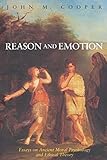Reason and Emotion : Essays on Ancient Moral Psychology and Ethical Theory / John M. Cooper.
Material type: TextPublisher: Princeton, NJ : Princeton University Press, [2021]Copyright date: ©1999Description: 1 online resource (604 p.)Content type:
TextPublisher: Princeton, NJ : Princeton University Press, [2021]Copyright date: ©1999Description: 1 online resource (604 p.)Content type: - 9780691223261
- Ethics, Ancient
- PHILOSOPHY / History & Surveys / Ancient & Classical
- Antiochus
- Athenaeus
- Bruns, Ivo
- Burkert, W
- Chrysippus
- Cicero
- Diotima
- Epictetus
- Isocrates
- Kelsey, Sean
- Lucretius
- Marcus Aurelius
- Mitsis, Phillip
- Olympiodorus
- Penner, T
- Plotinus
- Posidonius
- Priam
- Strauss, L
- akrasia
- altruism
- animals
- co-instantiation
- courage
- death
- dialectic
- educators
- empiricism
- ethics
- eudaimonism
- flourishing
- goods, external
- hedonism
- imagination
- incontinence
- interentailment of virtues
- justice
- knowledge
- language
- moral psychology
- motivations, human
- music
- nature
- nonrational desires
- objectivity
- oratory
- perfection
- phantasiai
- piety
- rhetoric
- self-awareness
- suicide
- 170/.938 21
- BJ161
- BJ161
- online - DeGruyter
| Item type | Current library | Call number | URL | Status | Notes | Barcode | |
|---|---|---|---|---|---|---|---|
 eBook
eBook
|
Biblioteca "Angelicum" Pont. Univ. S.Tommaso d'Aquino Nuvola online | online - DeGruyter (Browse shelf(Opens below)) | Online access | Not for loan (Accesso limitato) | Accesso per gli utenti autorizzati / Access for authorized users | (dgr)9780691223261 |
Browsing Biblioteca "Angelicum" Pont. Univ. S.Tommaso d'Aquino shelves, Shelving location: Nuvola online Close shelf browser (Hides shelf browser)

|

|

|

|

|

|

|
||
| online - DeGruyter Faithful and Fearless : Moving Feminist Protest inside the Church and Military / | online - DeGruyter Bardic Nationalism : The Romantic Novel and the British Empire / | online - DeGruyter Charles Ives and His World / | online - DeGruyter Reason and Emotion : Essays on Ancient Moral Psychology and Ethical Theory / | online - DeGruyter Walter Baade : A Life in Astrophysics / | online - DeGruyter Battling Western Imperialism : Mao, Stalin, and the United States / | online - DeGruyter Vampires, Dragons, and Egyptian Kings : Youth Gangs in Postwar New York / |
Frontmatter -- Contents -- Preface -- Acknowledgments -- Editorial Note -- Part One. Socrates and Plato -- 1. Notes on Xenophon's Socrates -- 2. Socrates and Plato in Plato's Gorgias -- 3. The Unity of Virtue -- 4. Plato's Theory of Human Motivation -- 5. The Psychology of Justice in Plato -- 6. Plato's Theory of Human Good in the Philebus -- 7. Plato's Statesman and Politics -- Part Two. Aristotle -- 8. The Magna Moralia and Aristotle's Moral Philosophy -- 9. Contemplation and Happiness: A Reconsideration -- 10. Some Remarks on Aristotle's Moral Psychology -- 11. Reason, Moral Virtue, and Moral Value -- 12. Aristotle on the Authority of "Appearances5 -- 13. Aristotle on the Goods of Fortune -- 14. Aristotle on the Forms of Friendship -- 15. Friendship and the Good in Aristotle -- 16. Political Animals and Civic Friendship -- 17. Justice and Rights in Aristotle's Politics -- 18. Ethical-Political Theory in Aristotle's Rhetoric -- 19. An Aristotelian Theory of the Emotions -- Part Three. Hellenistic Philosophy -- 20. Eudaimonism, the Appeal to Nature, and "Moral Duty55 in Stoicism -- 21. Posidonius on Emotions -- 22. Pleasure and Desire in Epicurus -- 23. Greek Philosophers on Euthanasia and Suicide -- Bibliography Of Works Cited -- Index Of Passages -- General Index
restricted access online access with authorization star
http://purl.org/coar/access_right/c_16ec
This book brings together twenty-three distinctive and influential essays on ancient moral philosophy--including several published here for the first time--by the distinguished philosopher and classical scholar John Cooper. The volume gives a systematic account of many of the most important issues and texts in ancient moral psychology and ethical theory, providing a unified and illuminating way of reflecting on the fields as they developed from Socrates and Plato through Aristotle to Epicurus and the Stoic philosophers Chrysippus and Posidonius, and beyond. For the ancient philosophers, Cooper shows here, morality was "good character" and what that entailed: good judgment, sensitivity, openness, reflectiveness, and a secure and correct sense of who one was and how one stood in relation to others and the surrounding world. Ethical theory was about the best way to be rather than any principles for what to do in particular circumstances or in relation to recurrent temptations. Moral psychology was the study of the psychological conditions required for good character--the sorts of desires, the attitudes to self and others, the states of mind and feeling, the kinds of knowledge and insight. Together these papers illustrate brilliantly how, by studying the arguments of the Greek philosophers in their diverse theories about the best human life and its psychological underpinnings, we can expand our own moral understanding and imagination and enrich our own moral thought. The collection will be crucial reading for anyone interested in classical philosophy and what it can contribute to reflection on contemporary questions about ethics and human life.
Mode of access: Internet via World Wide Web.
In English.
Description based on online resource; title from PDF title page (publisher's Web site, viewed 27. Jan 2023)


